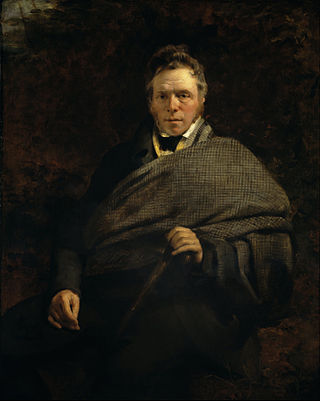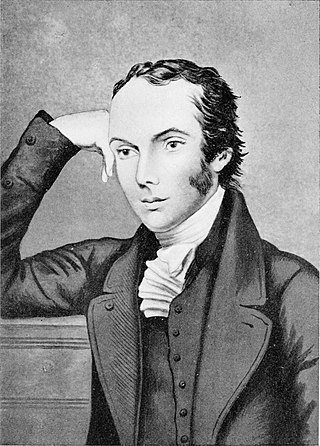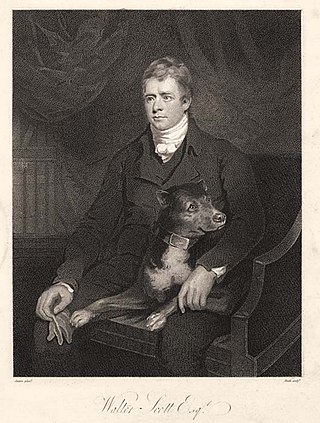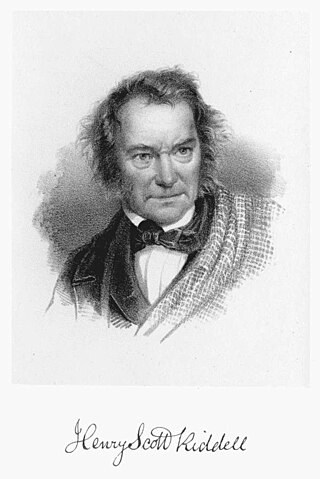Related Research Articles

Sir Walter Scott, 1st Baronet, was a Scottish novelist, poet and historian. Many of his works remain classics of European and Scottish literature, notably the novels Ivanhoe (1819), Rob Roy (1817), Waverley (1814), Old Mortality (1816), The Heart of Mid-Lothian (1818), and The Bride of Lammermoor (1819), along with the narrative poems Marmion (1808) and The Lady of the Lake (1810). He had a major impact on European and American literature.

James Hogg was a Scottish poet, novelist and essayist who wrote in both Scots and English. As a young man he worked as a shepherd and farmhand, and was largely self-educated through reading. He was a friend of many of the great writers of his day, including Sir Walter Scott, of whom he later wrote an unauthorised biography. He became widely known as the "Ettrick Shepherd", a nickname under which some of his works were published, and the character name he was given in the widely read series Noctes Ambrosianae, published in Blackwood's Magazine. He is best known today for his novel The Private Memoirs and Confessions of a Justified Sinner. His other works include the long poem The Queen's Wake (1813), his collection of songs Jacobite Relics (1819), and his two novels The Three Perils of Man (1822), and The Three Perils of Woman (1823).

James Ballantyne was a Scottish solicitor, editor and publisher who worked for his friend Sir Walter Scott. His brother John Ballantyne (1774–1821) was also with the publishing firm, which is noted for the publication of the Novelist's Library (1820), and many works edited or written by Scott.

Thomas Pringle was a Scottish writer, poet and abolitionist. Known as the father of South African poetry, he was the first successful English language poet and author to describe South Africa's scenery, native peoples, and living conditions.

The Private Memoirs and Confessions of a Justified Sinner: Written by Himself: With a detail of curious traditionary facts and other evidence by the editor is a novel by the Scottish author James Hogg, published anonymously in 1824.

Minstrelsy of the Scottish Border is an anthology of Border ballads, together with some from north-east Scotland and a few modern literary ballads, edited by Walter Scott. It was first published by Archibald Constable in Edinburgh in 1802, but was expanded in several later editions, reaching its final state in 1830, two years before Scott's death. It includes many of the most famous Scottish ballads, such as Sir Patrick Spens, The Young Tamlane, The Twa Corbies, The Douglas Tragedy, Clerk Saunders, Kempion, The Wife of Usher's Well, The Cruel Sister, The Dæmon Lover, and Thomas the Rhymer. Scott enlisted the help of several collaborators, notably John Leyden, and found his ballads both by field research of his own and by consulting the manuscript collections of others. Controversially, in the editing of his texts he preferred literary quality over scholarly rigour, but Minstrelsy of the Scottish Border nevertheless attracted high praise from the first. It was influential both in Britain and on the Continent, and helped to decide the course of Scott's later career as a poet and novelist. In recent years it has been called "the most exciting collection of ballads ever to appear."

Henry Scott Riddell was a Scottish poet and songwriter. In the Scottish Orpheus, a collection of songs of Scotland by Adam Hamilton, he is credited with writing Scotland Yet and The Dowie Dens O' Yarrow.

Lady Louisa Stuart was a British writer of the 18th and 19th centuries. Her long life spanned nearly ninety-four years.

The Journal of Sir Walter Scott is a diary which the novelist and poet Walter Scott kept between 1825 and 1832. It records the financial disaster which overtook him at the beginning of 1826, and the efforts he made over the next seven years to pay off his debts by writing bestselling books. Since its first complete publication in 1890 it has attracted high praise, being considered by many critics one of the finest diaries in the language.
The Queen's Wake is a narrative poem by James Hogg, first published in 1813. It consists of an Introduction, three Nights, and a Conclusion, totalling over five thousand lines, and there are also authorial notes. The poem presents the contributions, in various metres, of a series of Scottish bards to a competition organised by Mary, Queen of Scots on her arrival in Scotland from France in 1561.
The Three Perils of Man; or, War, Women, and Witchcraft. A Border Romance (1822) is a novel by James Hogg set in the Scottish Borders during the reign of Robert II, King of Scots (1371–90).
The Mountain Bard (1807), containing 21 poems, was James Hogg's first substantial poetical publication.
The Spy was a periodical directed at the Edinburgh market, edited by James Hogg, with himself as principal contributor, which appeared from 1 September 1810 to 24 August 1811. It combined features of two types of periodical established in the 18th century, the essay periodical and the miscellany. As an outsider, Hogg used his periodical to give a critical view of the dominant upper-class culture of Edinburgh, with Walter Scott and Francis Jeffrey as its leading lights, and to launch his career as a writer of fiction as well as poetry.
The Pilgrims of the Sun is a narrative poem by James Hogg, first published in December 1814, dated 1815. It consists of four cantos, totalling somewhat less than 2000 lines. In similar vein to 'Kilmeny' in The Queen's Wake (1813), it tells of a young woman's journey to an ideal world and her return to Earth.
Tales of the Wars of Montrose is a set of six fictional narratives by James Hogg published in 1835. Each of them centres on the fortunes of an individual during the civil conflict of the 1640s in Scotland.
The Shepherd's Calendar (1829) is a collection by James Hogg of 21 articles, most of which had appeared in Blackwood's Edinburgh Magazine since 1819. They are set in, or deal with aspects of, the Scottish Borders, in particular Hogg's native Ettrick Forest.
The Brownie of Bodsbeck (1818) is the first (short) novel by James Hogg. Set in the Scottish Borders in 1685 it presents a sympathetic picture of the persecuted Covenanters and a harsh view of the Royalists led by Clavers (Claverhouse). It draws extensively on local superstitions.

Letters on Demonology and Witchcraft Addressed to J. G. Lockhart, Esq. (1830) was a study of witchcraft and the supernatural by Sir Walter Scott. A lifelong student of folklore, Scott was able to draw on a wide-ranging collection of primary and secondary sources. His book found many readers throughout the 19th century, and exercised a significant influence in promoting the Victorian vogue for Gothic and ghostly fiction. Though on first publication it met with mixed reviews, it is now recognised as a pioneering work of scientific anthropology, treating of its subject in an acute and analytical way which prefigures later scholarship on the subject, as well as presenting a highly readable collection of supernatural anecdotes.
The letters of Sir Walter Scott, the novelist and poet, range in date from September 1788, when he was aged 17, to June 1832, a few weeks before his death. About 7000 letters from Scott are known, and about 6500 letters addressed to him. The major repository of both is the National Library of Scotland. H. J. C. Grierson's The Letters of Sir Walter Scott (1932–1937), though it includes only about 3500, remains the standard edition.
Margaret Laidlaw m. Hogg (1730-1813) was a tradition-bearer who collected native Scottish ballads from Ettrick in the Scottish Borders.
References
- ↑ The history of the Familiar Anecdotes is given in Douglas S. Mack, 'Note on the Genesis of the Texts' included in James Hogg, Anecdotes of Scott, ed. Jill Rubenstein (Edinburgh, 1999), xxx‒lvi.
- ↑ Rubenstein, Anecdotes of Scott, xli.
- ↑ For an analysis of the differences see J. H. Alexander, ' Anecdotes to Familiar Anecdotes ', Studies in Hogg and his World, 13 (2002), 5‒15, especially 5‒6.
- ↑ Rubenstein, Anecdotes of Scott, xxvii–xxviii.
- ↑ Rubenstein Anecdotes of Scott, l.
- ↑ Rubenstein Anecdotes of Scott, xxviii; the edition was also published in Edinburgh and London (l).